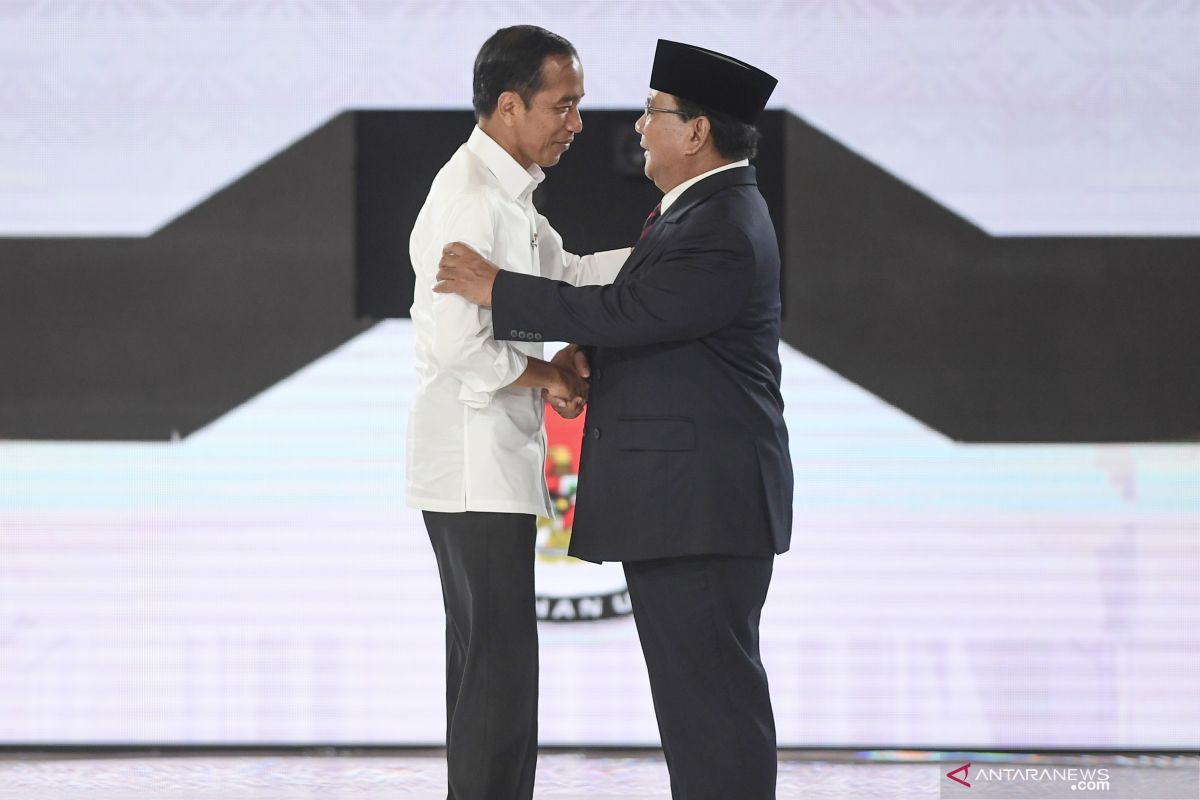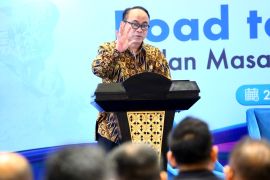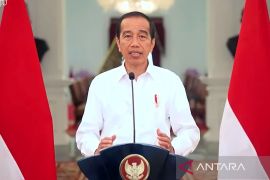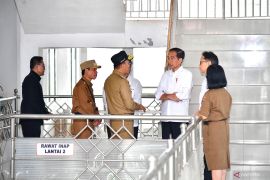Saturday evening will witness the final clash of titans -- presidential and vice-presidential pairs -- as they go the whole hog to cement a strong voter base from 192 million casting votes on Apr 17.
This final round of debate between the Joko Widodo (Jokowi)-Ma'ruf Amin and Prabowo Subianto-Sandiaga Uno pairs prioritizes critical matters concerning the economy, social welfare, finance and investment, as well as trade and industry.
Such issues will undeniably have a say in determining Indonesia's present and future, as they become key factors in driving the nation's sustainable development and making the public more prosperous.
In reality, Indonesia, registering a 5.2 percent growth last year, is reeling under serious challenges including economic stagnation and a wide economic gap among its citizens since several years.
Hence, the Jokowi-Amin and Subianto-Uno pairs should be able to present a prudent strategy to tackle Indonesia's issues in the fields of economy, social welfare, finance and investment, as well as trade and industry.
As the incumbent president, Jokowi and his running mate, Amin, are faced with a heavy dilemma to draw trust of the nation and undecided voters casting their votes in the upcoming presidential elections and portray the government's accomplishments that he has led until now.
In its place, as a challenger, Subianto is looking to expose any shortcomings in policies and performance of the Jokowi-Jusuf Kalla administration in the debated sectors, and along with his running mate, Uno, seeks to provide concrete solutions.
It would be a half-hearted attempt by the Subianto-Uno pair to vocalize its pledges and commitment to tackling weaknesses and hurdles faced by the ruling government in its five-year term without providing an adept roadmap and grand strategy.
Simply put, the presidential and vice-presidential candidate pairs are left with no choice but to present their concrete and measurable grand strategy and action plans to overcome existing hurdles and problems.
For the final debate, the General Elections Commission (KPU) has also decided on 10 panelists in charge of conjuring up and preparing questions on the issues to be debated by the duo pairs.
The panelist team comprises economists from various universities and organizations chosen by the KPU, specifically Muhammad Nasi, the Airlangga University rector; Eddy Suratman from the University of Tanjungpura; Muhammad Arief Mufraini from the Syarif Hidayatullah Islamic State University; and Suhartono from Diponegoro University.
Other eminent members of the panel feature Herman Karamoy from Sam Ratulangi University; I Nyoman Mahaendra Yasa from Udayana University; Harif Amali Riva'i from Andalas University; Dermawan Wibisono from Bandung Institute of Technology; Tukiman Taruno Sayoga from Soegijapranata Catholic University; and Rahmi Hertanti, the executive director of Indonesia Global Justice (IGJ).
The KPU has also announced that it had completed requisite technical preparations to organize the final round of debate, scheduled at the Sultan Hotel, Jakarta, on Saturday evening.
On Friday afternoon and evening, the KPU held mock sessions along with representatives of both camps to ascertain smooth implementation of the fifth round of the presidential debate, KPU Commissioner Viryan Aziz informed journalists.
The commission has handed out 150 additional invites to the two presidential and vice presidential candidate camps, as several others are interested in witnessing this final round of debate, he remarked.
Aziz believes that Jokowi and Subianto will channel all their strengths and might to make the outcome of the final debate work in this favor. The pairs are looking to make the debate a platform to focus on discussions on economic issues to disseminate information on their vision and mission.
How Jokowi and his contender Subianto fare on Apr 13 will weigh heavy on the election results, as it is the last opportunity to sum up support of undecided voters.
During the fourth round of debate on Apr 30, presidential candidate number 02, Subianto, decidedly went all offensive against Jokowi, a 360-degree turn to his "reconciliatory approach" during his two earlier debates with Jokowi, as observed by University of Indonesia's (UI's) political analyst Vishnu Juwono.
"Prabowo's decision to avoid adopting a reconciliatory approach and adopting a offensive stand was perhaps taken on grounds that he is in the opposition," he remarked.
Highlighting the two presidential candidates' performance in their latest debate, Juwono, a noted lecturer at UI's Administration Science Department, pointed to the fact that Subianto, being in the opposition, was basically looking to haul a blistering attack on the government's performance.
Juwono believes that Subianto's strategy shift at reproving the government over its policies can also be a ploy to cement his voter base.
Several pollsters continue to point to a decline in the Subianto-Uno pair's electability behind that of the Jokowi-Amin pair, and the Subianto-Uno pair is upbeat of this novel strategy driving their electability in comparison with Jokowi's.
Regardless of whether the Jokowi-Amin and Prabowo-Sandi pairs adopt a reconciliatory or offensive approach in their final debate, Indonesians, looking to cast their ballot on Apr 17, are eager to get a heads-up on their concrete grand strategies and action plans to rescue Indonesia from its economic stagnation.
With a much higher economic growth, hopes ride high on the future government creating more job opportunities for Indonesians and ensuring affordable prices of basic commodities.
EDITED BY INE
Editor: Eliswan Azly
Copyright © ANTARA 2019












